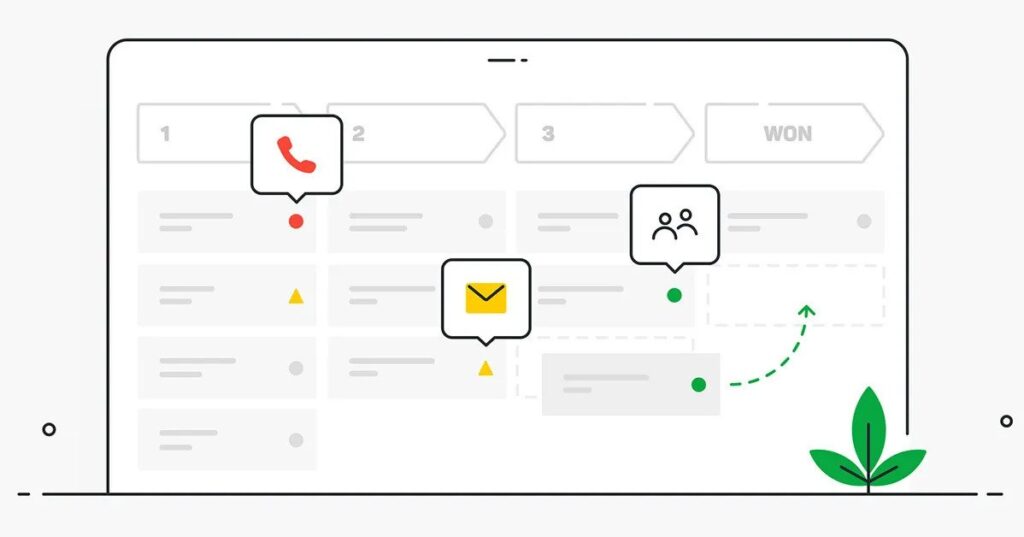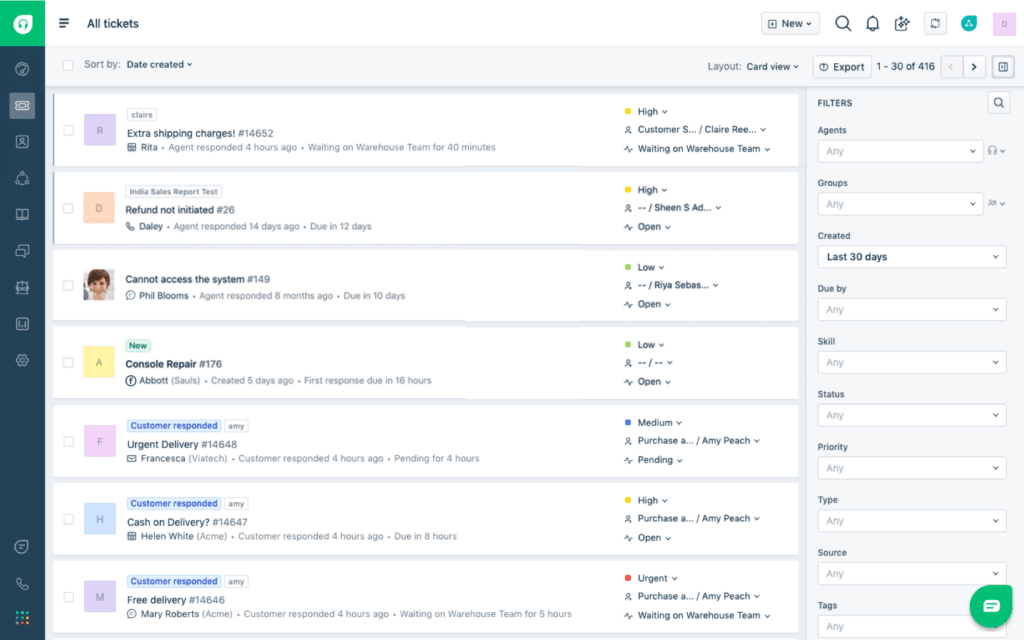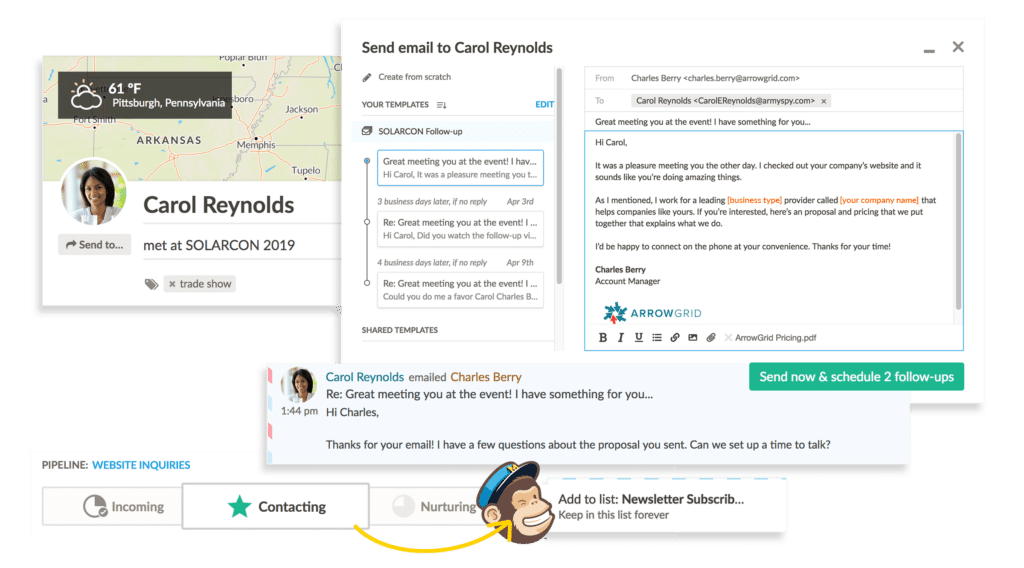Hey there, before you sigh or mull about this frequently thrown around jargon: the CRM – here are a few interesting statistics: CRM implementation yields an average ROI of $8.71 for an investment of $1 – which is an approximate 9x return. Leads nurtured in a CRM ecosystem are converted 47% of the time. CRM enables businesses to improve customer retention rates by 27%.
Breaking Down CRM
CRM stands for Customer Relationship Management. Don’t fret just yet. This analogy is going to help you understand what CRM software is.
Imagine you have a bunch of friends, and you’d like to remember when their birthdays are – to surprise and stay in touch with them. If you’re old school like me, you might have a notebook and note down their birthdays. A CRM application is just a digital notebook that helps you track essential information of your customers and potential clientele.
Just like how my notebook helps me maintain good relationships with my friends, a CRM tool helps your business touch base with its customers. However, customers bring a lot more than just birthdays to record. Accounting, customer service, billing, and orders are other vital pieces of data to maintain
You’re probably wondering, “Okay, so why do I need to have this fancy tool implemented, when I’m Excel savvy and can track customer-related data on spreadsheets?”
Here’s how CRM helps transform your businesses:
1. Streamlines Collaboration Effectively
In a nutshell, CRM is like a know-it-all & store-it-all centralized tool that literally documents all interactions with customers or leads. Now, when your multiple teams access this same information, collaboration is a breeze.
Marketing, sales, and customer service teams can provide valuable insights for converting leads. Consequently, your organization begins to work seamlessly harnessing the full capabilities of all cross-functional teams.

2. Reduces Sales Costs
There’s a 60-70% chance of re-selling to an existing customer compared to the 5-20% chance of converting a new prospect. (Source: Marketing Metrics)
Well, it takes money to make money. What if you could reduce the funds needed to bring in more money?
CRM software helps reduce customer acquisition costs and gain better visibility into upselling, renewal, and cross-selling opportunities. (Think of these as add-ons that you offer the more regular customers.) As a result, you generate more revenue out of repeatable sales and spike up customer retention.
Additionally, CRM also helps in closing deals faster, as order processing and quote preparation amongst other sales activities are all automated – thus driving down production costs and increasing sales revenue.
3. Ramps Up Your Customer Service
A better customer experience translates to 55% of customers willing to pay more. (source: Defaqto Research)
A CRM implementation provides your entire team with centralized access to every customer’s complete interaction history – thus helping with personalization and better customer service. Smoother interactions garner trust and encourage repeat sales.

Proactive responses to queries are the key to a millennial customer’s heart, and a CRM system helps you achieve that.
4. Increases the Probability of Success
You probably spend tons of time and resources in generating new leads, what next? Your sales team works on all these leads exerting the same amount of effort. Interestingly, CRM helps identify which leads are “hot”, thus enabling you to concentrate your energy on the more probable opportunities.
Moreover, your sales and marketing teams have access to a comprehensive list of leads & prospects, and their statuses. Consequently, they can create and initiate engaging interactions to convert leads into customers. The bottom line is that your sales efficiency improves, and you can prioritize your resources.
5. Boosts Productivity
CRM increases corporate teams’ productivity by 50% or more. (source: Forrester)
As your business adds customers, data generation will simply keep skyrocketing. Account information, customer care details, FAQs, etc. are vital information that needs quick access.
You need to upgrade from merely using sticky-notes and haphazard filing cabinets to categorize and quantify such essential data for future reference. From personal experience, half of the reminders I set myself on sticky notes end up in the trash. Don’t allow this to happen with your valuable customers’ information.
CRM software presents all this information in an easy to use and intuitive dashboard setup, thus boosting productivity and effectiveness.
6. Levels Up Your Email Marketing Campaigns
The CRM software is a very versatile tool – offering integrations with several other software – thus adding immense value in every part of your sales funnel.

CRM email marketing helps personalize and add that unique touch to prospective clients. Additionally, you have access to a gold mine of information like open rates, close rates, and clicks on CTAs – which provide valuable insights to tweaking your efforts to devise that perfect recipe for conversion.
Instead of having a spray & pray approach to email marketing, you can compare your marketing campaigns, and utilize data to make the right decisions.
7. Keeps Your Social Media Engaged
Imagine if you could track your social interactions with customers to improve customer service and satisfaction. Well, stop imagining because CRM makes this possible.
A CRM social media integration incorporates a customer’s entire interaction history across your social channels. As a result, you tend to identify customers’ purchasing habits and tweak your social advertisements with more customized offers.
Your sales reps can leverage this data to accurately gather demographics and build a useful buyer’s persona – (which is a profile of your most likely customer).
<< How to activate age demographics in Google Analytics
8. Kills Meetings
Let’s face it: Meetings suck. “Over 70% of employees multitask during meetings, and 90% daydream” (Source: HUONE)
CRM software eliminates the need for these boring and unproductive meetings, as there’s a central location for all kinds of customer-related information. You can wave goodbye to those never-ending status update meetings.
A CRM system helps build long-term relationships remotely and reduce transportation costs. Also, considering the current COVID pandemic, your quarantines sales reps can still engage with customers effectively.
9. Eliminates Redundant or Double Work
Redundancy is the enemy of productivity. Consider this scenario: Your sales rep initiates a conversation with an interested buyer, and drafts a mail. Now, for your whole team to be on the same page, the sales rep forwards the email thread to the sales team.
CRM helps avoid such double work, by automatically updating and tagging relevant interactions against the right customers/leads.
Moreover, there’s a myriad of documents that pop up like RFPs, invoices, quotes, etc. CRM helps with meticulously handling these documents and making them readily accessible for quick edits or uploads.
Wrapping Up
CRM is more than just a software upgrade. We are talking more about an organizational transformation: From improved productivity & collaboration to smarter means of adding value to customers, a CRM implementation is an indispensable investment for your business.
Your customers are the pivotal aspect of your company, and satisfying them must be your top priority. Therefore, do think about implementing a CRM solution at your firm – to gear up and start adding all rounded value like never before.


